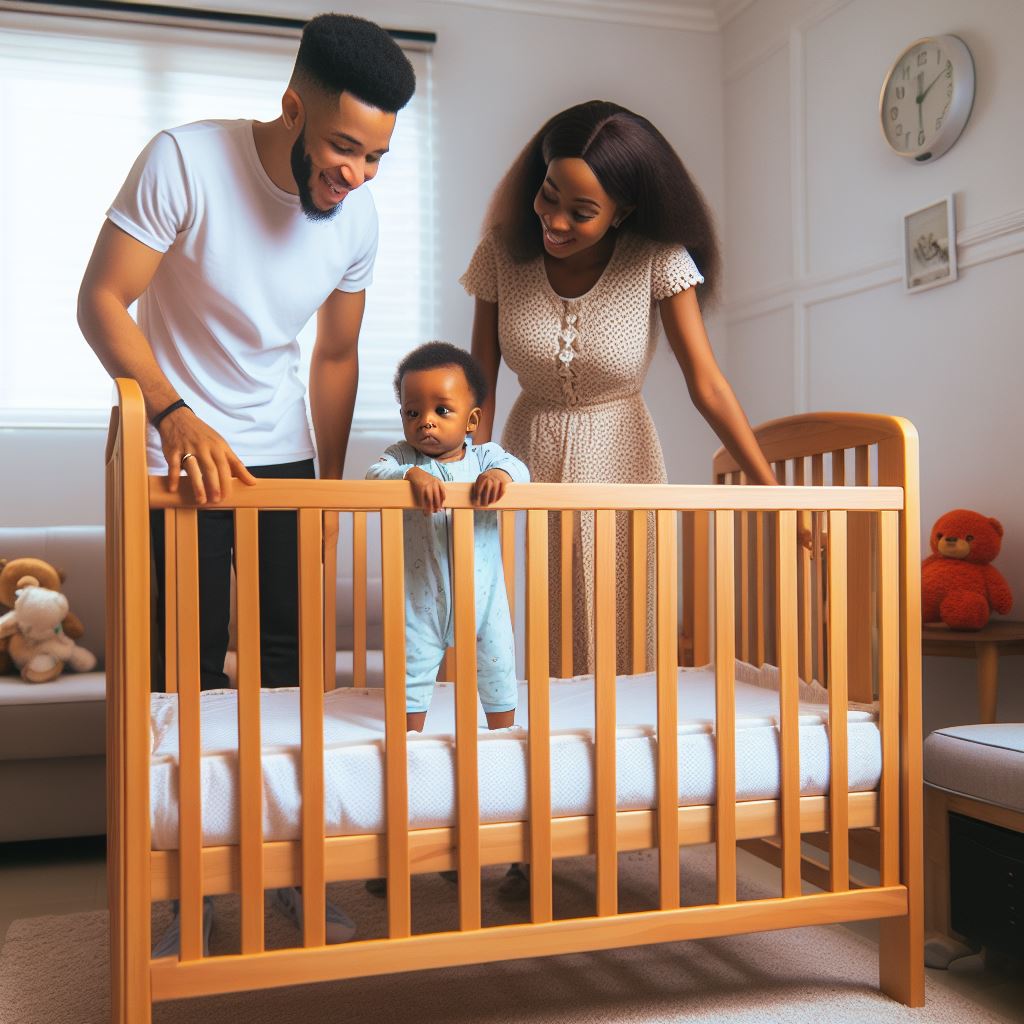Introduction
Importance of Baby Safety
The safety and well-being of infants and toddlers within Nigerian households are of utmost significance.
As parents or caregivers, safeguarding their environment against potential hazards is a foundational responsibility.
Every parent desires a secure haven where their little ones can explore and grow without encountering preventable dangers.
The vulnerability of babies to various household risks necessitates a vigilant approach towards creating a safe space.
Overview of Common Baby Hazards in Nigeria
Nigerian homes present a distinctive array of potential hazards that require careful consideration.
Factors such as unstable furniture, inadequate securing of heavy items, open electrical sockets, and unguarded staircases pose significant risks to curious and exploring infants.
Prevalent challenges like unreliable construction standards, inconsistent safety regulations, and diverse cultural practices further contribute to the complexity of ensuring a hazard-free environment for babies in Nigeria.
Purpose of the Blog
This comprehensive blog post is dedicated to empowering parents and guardians with valuable insights and actionable strategies.
Its primary objective is to assist in identifying, mitigating, and ultimately eliminating potential hazards within Nigerian households.
By raising awareness and offering practical guidance, this resource aims to equip individuals with the knowledge and tools necessary to fortify their homes against dangers that might otherwise pose a threat to the safety and well-being of their babies.
In subsequent sections, we will delve deeper into specific categories of hazards commonly found in Nigerian homes and provide practical steps and recommendations to effectively address these concerns.
We can create a secure environment where our little ones can thrive and explore safely.
Creating a Safe Sleep Environment
Choosing a Safe Crib or Bassinet
Selecting the right crib or bassinet is the foundation of a safe sleep environment.
Look for products that adhere to safety standards set by organizations like ASTM International or the Consumer Product Safety Commission (CPSC).
In Nigeria, these standards might vary, so consult with local authorities or check for approved certifications.
Parenting Made Just for You
Get personalized Parenting Solutions tailored to your child’s needs. Transform your parenting journey with expert guidance in 1-3 days.
Get StartedEnsure the slats are no more than 2-3/8 inches apart to prevent the baby’s head from getting stuck.
Inspect the crib or bassinet for any missing or broken parts and confirm its stability to avoid potential accidents.
Ensuring Proper Crib Mattress and Bedding
The mattress’s firmness is crucial. It should fit snugly inside the crib, leaving no gaps between the mattress and the crib’s sides.
A firm mattress helps reduce the risk of suffocation and ensures the baby’s safety during sleep.
Avoid soft bedding items such as blankets, pillows, and bumper pads.
These can pose a suffocation hazard or cause overheating. Instead, opt for a fitted sheet specifically designed for cribs and bassinets to keep the sleeping surface smooth and safe.
Placing Baby on Their Back to Sleep
The sleeping position significantly impacts a baby’s safety. Always place the baby on their back for naps and bedtime.
This sleeping position is crucial to reduce the risk of Sudden Infant Death Syndrome (SIDS).
Encourage this practice consistently, ensuring that caregivers and family members are also aware of the importance of placing the baby on their back during sleep.
Avoiding Suffocation Hazards
Pillows, blankets, and stuffed animals should not be placed inside the crib or bassinet.
These items increase the risk of suffocation, obstructing the baby’s airways.
To provide comfort and warmth, consider using sleep sacks or wearable blankets designed for babies.
These alternatives keep the baby warm without posing a suffocation hazard.
Creating a Comfortable Room Temperature
Maintaining an optimal room temperature between 68°F to 72°F (20°C to 22°C) is essential for a baby’s comfort and safety during sleep.
Unveil the Perfect Name that Tells Your Family's Story
Let us help you find a name that embodies your family's values, traditions, and dreams. Our personalized consultation weaves cultural insights to create a name that's uniquely yours.
Get StartedNigerian climates can vary, so adjust accordingly. Use a room thermometer to monitor the temperature and dress the baby in light sleep clothing to prevent overheating.
Avoid overdressing the baby, ensuring they remain comfortable without being too hot or too cold.
By paying close attention to these detailed aspects, parents in Nigeria can create a secure sleep environment for their babies, promoting safety and sound sleep, essential for their overall well-being.
Read: Feeding Safety: Nigerian Baby Food Guidelines
Preventing Accidents and Falls
A baby’s safety is of utmost importance in Nigerian homes. To ensure their well-being, it is crucial to take preventive measures against accidents and falls.
Here are some essential steps:
Installing safety gates on stairs
Stairs can be dangerous for crawling or walking babies.
By installing safety gates, you can create a physical barrier to prevent your little one from accessing the stairs unsupervised.
Ensure that the gates are sturdy and properly secured.
Securing heavy furniture and appliances to prevent tipping
Babies are curious explorers, and they often tend to pull or climb onto furniture.
To avoid any accidents, anchor heavy furniture and appliances, such as bookshelves, TV stands, and cabinets, securely to the wall.
It will prevent them from toppling over and causing serious injuries.
Removing small objects that can be choking hazards
Small objects pose a significant risk of choking for babies.
Be vigilant in removing small toys, coins, buttons, batteries, or any other tiny items from their play areas.
Regularly scan the floor and other surfaces for potential choking hazards.
Keeping baby away from stairs and balconies
Babies and young children should always be kept away from stairs and balconies unless closely supervised.
These areas can pose severe falling hazards. Utilize safety gates at the top and bottom of stairs, and ensure that balcony railings are secure and childproof.
Using corner protectors to prevent injuries from sharp furniture edges
Furniture edges, often sharp and pointed, can unintentionally harm a baby who is starting to crawl or walk.
Install corner protectors on tables, cabinets, and other furniture to create a cushioning effect and minimize the risk of injuries from accidental collisions.
By implementing these safety measures, you can significantly reduce the chances of accidents and falls, creating a secure environment for your baby to explore and grow.
Constant supervision and regular safety checks are essential in maintaining a hazard-free home for your little one.
Electrical Safety
Electrical safety is of paramount importance when it comes to creating a safe environment for your baby at home.
Babies are naturally curious, and their desire to explore their surroundings can put them at risk of accidents.
By taking a few precautions, you can minimize potential electrical hazards and keep your bundle of joy safe and secure.
Covering electrical outlets with safety caps
Babies are prone to sticking their fingers or objects into electrical outlets, which can lead to severe injuries or even electrocution.
Prevent these accidents by using safety caps to cover all exposed outlets.
These caps are easy to install and serve as a barrier between curious hands and electrical current.
Keeping cords out of baby’s reach
Babies love to grab and pull on things, including electrical cords. These cords can pose choking hazards, and if damaged, they may expose live wires.
Make sure to keep cords from lamps, TVs, and other gadgets out of your baby’s reach.
Use cord clips or tape to secure cords along walls or furniture to keep them tidy and out of sight.
Using cordless window blinds or securing cords safely
Window blind cords can be dangerous as they can accidentally wrap around a baby’s neck, causing strangulation.
Opt for cordless window blinds or tie up cords with hooks or safety devices.
Keeping them high and unreachable for the baby is the best approach to ensure their safety.
Avoiding the use of extension cords or overloading sockets
Overusing extension cords or overloading sockets can result in electrical fires or shocks.
It’s essential to have enough outlets to power your devices without the need for multiple extension cords.
If extension cords are necessary, use them temporarily and avoid placing them in areas where your baby can trip over them.
Educating older children about electrical safety
If you have older children in the house, it’s crucial to educate them about electrical safety.
Teach them the potential risks, how to avoid accidents, and why it’s important to handle electrical devices responsibly.
Encourage them to be mindful of their younger siblings and help keep them safe from electrical hazards.
Remember, electrical safety should never be taken lightly. It only takes a momentary lapse in supervision for an accident to occur.
By implementing these electrical safety measures, you can provide a secure environment for your baby to explore and grow in, free from unnecessary electrical hazards.
Stay vigilant, and always prioritize your baby’s safety when it comes to household electrical systems.
Read: Childproofing Your Home: A Nigerian Perspective
Kitchen Safety
Secure Knives and Utensils
Keeping sharp objects like knives and utensils out of a baby’s reach is critical.
Children are naturally curious and might grab objects within their sight.
It’s essential to store knives and sharp utensils in high or locked cabinets, making them inaccessible to children.
Consider using knife blocks or drawer organizers designed to hold knives securely and out of reach.
Lock Cabinets and Drawers
Securing cabinets and drawers with baby-proof locks is a vital step in preventing accidents.
Babies love exploring every nook and cranny, and they might open cabinets or drawers containing hazardous items like cleaning supplies, sharp tools, or potentially toxic substances.
Install locks or latches designed specifically to prevent children from accessing these spaces.
It’s important to regularly check the locks for durability and effectiveness.
Distance Hot Surfaces
Hot surfaces and appliances in the kitchen pose a significant risk of burns to babies.
Keep hot items such as stovetops, ovens, kettles, and cooking appliances away from areas accessible to children.
Use back burners when cooking, ensuring handles of pots and pans are turned inward to prevent accidental spills.
Installing physical barriers or gates around the kitchen area can also help restrict access to hot surfaces.
Stove Guards for Safety
Stove guards are indispensable safety features in the kitchen.
These guards act as a barrier between the child and the hot stove, preventing accidental burns or spills.
They are typically heat-resistant and can be installed to create a physical barrier, reducing the chances of children touching hot burners or grabbing pots and pans.
Stove guards come in various designs and sizes, ensuring compatibility with different stove types.
Safe Storage of Chemicals
Proper storage of cleaning products and chemicals is crucial. Store these items in locked cabinets or high shelves that are out of a child’s reach.
Use childproof locks on cabinets containing these substances.
Consider using natural and safer alternatives for cleaning whenever possible to reduce the risk associated with chemical products.
Always keep them in their original containers and ensure labels are intact for easy identification.
Implementing these detailed safety measures in the kitchen ensures a secure environment for babies, reducing the risk of accidents and promoting a safe exploration space within Nigerian households.
Read: Safe Swaddling: Ensuring Baby’s Comfort and Safety

Bathing Safety
Ensuring proper water temperature
- Always test the water before placing your baby in the bathtub.
- Use a thermometer to ensure the water is warm, around 100°F (37°C).
- Avoid using hot water to prevent scalding your baby’s delicate skin.
Never leaving baby unattended in the bathtub
- Always stay with your baby during bath time, even if it’s just for a few minutes.
- Infants can drown in as little as one inch (2.5 cm) of water, so never leave them unsupervised.
- Keep all distractions, such as phones or doorbells, away to maintain focus on your baby’s safety.
Using anti-slip mats or stickers in the tub
- Place a non-slip mat or stickers on the bathtub floor to prevent your baby from slipping.
- Ensure the mat or stickers are securely attached and free from any water-resistant substances.
- Regularly clean and replace the mats/stickers to maintain their effectiveness.
Keeping toiletries and small objects out of reach
- Store all toiletries, such as shampoo, soap, and lotion, in a locked cabinet or high shelf.
- Securely close and latch bathroom cabinets to prevent curious babies from accessing hazardous substances.
- Remove any small objects, like hair accessories or jewelry, that can pose a choking hazard.
Checking bath toys for mold and mildew, replacing if needed
- Regularly inspect bath toys for signs of mold, mildew, or visible dirt.
- If any toys show signs of contamination, immediately discard and replace them.
- To clean bath toys, use a mixture of equal parts vinegar and water, then rinse thoroughly.
- Avoid using toys with holes that can accumulate water and harbor bacteria.
Bathing your baby should be a safe and enjoyable experience.
By taking the necessary precautions and following these guidelines, you can minimize the risk of accidents or injuries in the bathroom.
Remember, never leave your baby unattended, keep the water at the right temperature, use anti-slip safety measures, secure toiletries and small objects, and regularly check bath toys for cleanliness.
By prioritizing safety, you can create a nurturing and hazard-free environment for your little one’s bath time!
Read: Naptime Know-How: Scheduling Tips for Nigerian Babies
Preventing Poisoning
Avoiding common baby hazards in Nigerian homes is essential to ensure the safety and well-being of our little ones.
One significant aspect of this is preventing poisoning. Here are some crucial steps to take:
Storing Medications and Cleaning Products
Ensure the safety of your baby by storing medications and cleaning products in locked cabinets or high shelves out of their reach.
Nigerian homes often have a range of medications and potent cleaning agents. These should be stored securely to prevent accidental ingestion or exposure.
Use cabinets equipped with childproof locks or install safety latches to keep curious hands away from potentially harmful substances.
Consider organizing these cabinets in a way that separates medications from cleaning products to avoid confusion and accidental consumption.
Using Child-Resistant Caps on Medications
Child-resistant caps play a crucial role in preventing accidental poisoning. When purchasing medications, always opt for those packaged with child-resistant caps.
These specialized caps are designed to be challenging for young children to open, reducing the risk of ingestion.
Moreover, educate family members and caregivers about the importance of securely closing medication bottles after use.
Consistent vigilance is key to ensuring these safety measures are consistently upheld.
Avoiding Pesticides or Insecticides
In Nigeria, households may use various pesticides or insecticides to combat pests.
However, it’s vital to exercise caution when using these chemicals, especially in areas accessible to the baby.
Consider alternative pest control methods such as sealing entry points, using natural repellents like essential oils, or opting for professional pest control services that emphasize baby-safe treatments.
If pesticides must be used, ensure they are applied in areas far from the baby’s living spaces and strictly follow the manufacturer’s instructions for safe application and ventilation.
Properly Storing and Disposing of Batteries
Batteries, particularly button batteries, pose a severe risk of ingestion for babies.
Securely store spare batteries in locked compartments or use tape to secure battery compartments on devices.
When disposing of used batteries, seal them in a secure container and dispose of them appropriately in designated battery recycling centers.
Avoid leaving used batteries within reach of curious infants.
Identifying and Removing Poisonous Plants
Familiarize yourself with common poisonous plants in Nigeria and inspect your home and surroundings.
Remove any toxic plants or relocate them to areas inaccessible to your baby.
Educate yourself on the distinctive features of these plants to identify them accurately.
Encourage visitors and family members to avoid bringing potentially poisonous plants into your home, further reducing the risk of accidental ingestion or contact.
By following these detailed measures, parents and caregivers can significantly reduce the risk of poisoning hazards, creating a safer environment for their babies to grow and explore.
Conclusion
Ensuring the safety of your baby in Nigerian homes is of utmost importance.
By following the recommended safety measures, you can create a secure environment for your little one to thrive. Remember to:
- Keep hazardous materials and objects out of reach
- Secure furniture and electrical appliances to prevent tip-overs or accidents
- Install safety gates and use window guards
- Always supervise your baby, especially in the kitchen and bathroom
- Regularly check for potential hazards and make necessary adjustments
It is essential to prioritize baby safety at all times. Safety should never be compromised, even for a moment.
By being vigilant and proactive, you can prevent accidents and protect your little one from harm.
For more information on baby safety, refer to the following resources:
Remember, a safe environment is crucial for your baby’s development and well-being. Make baby safety a priority in your home.




